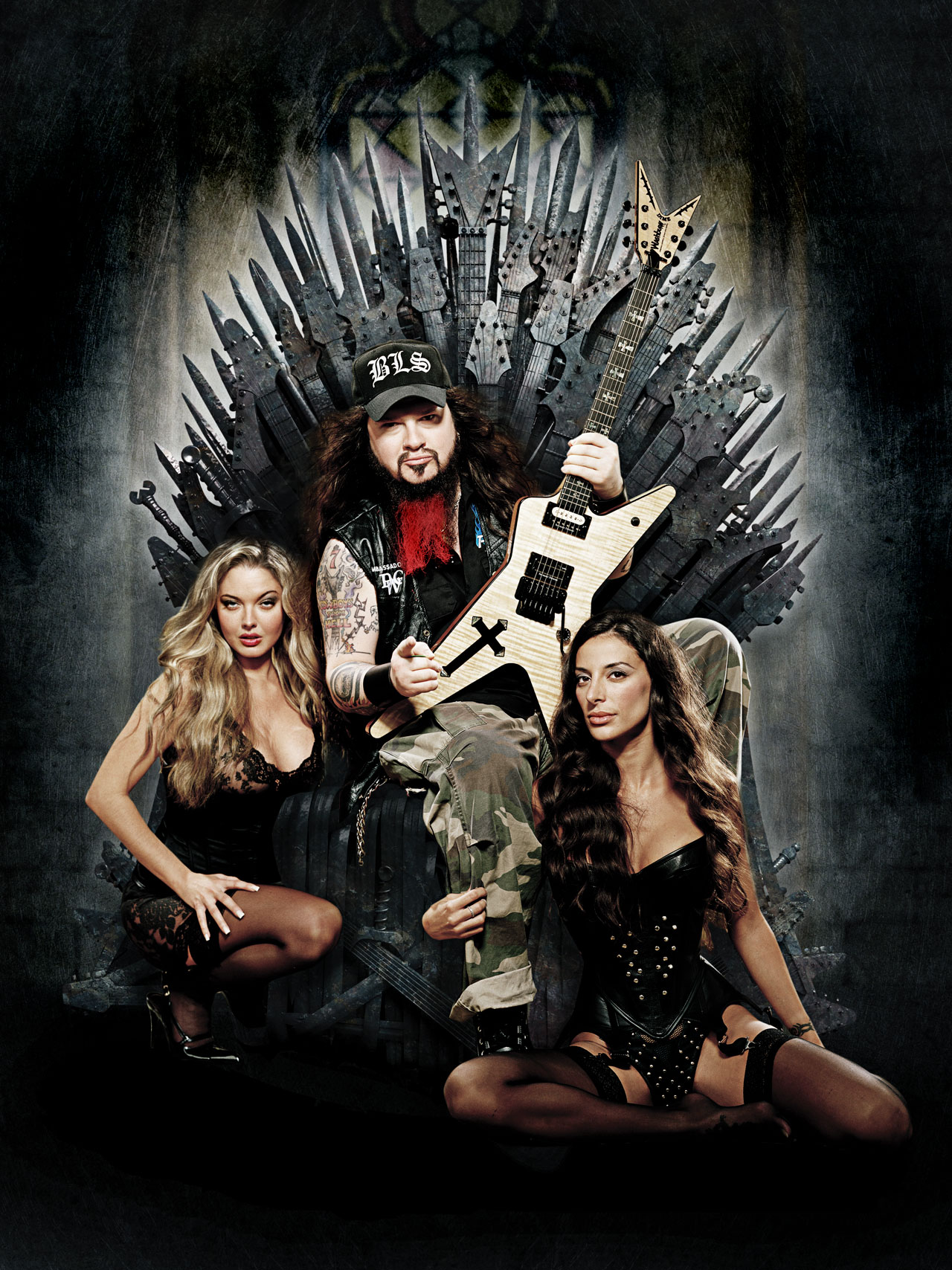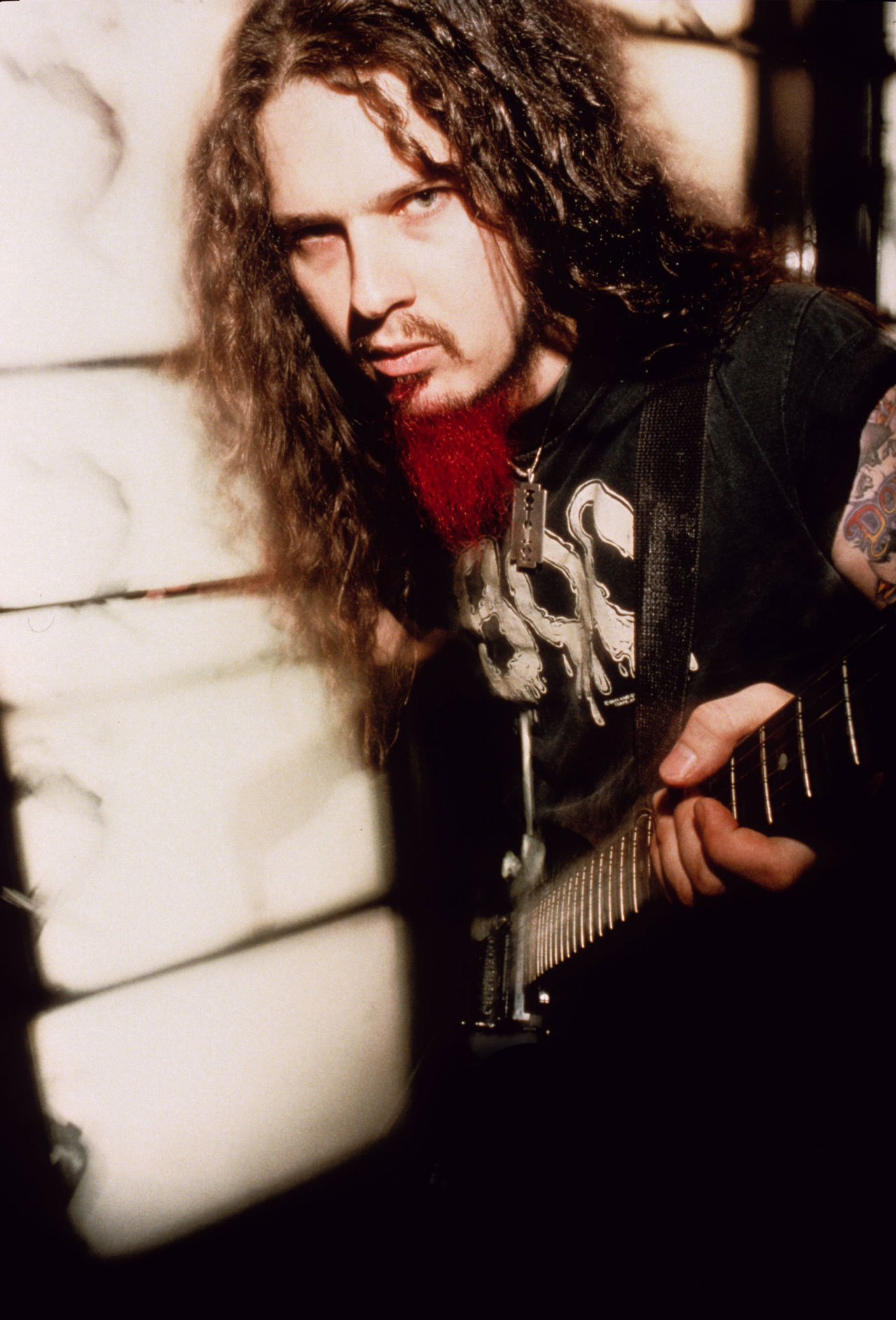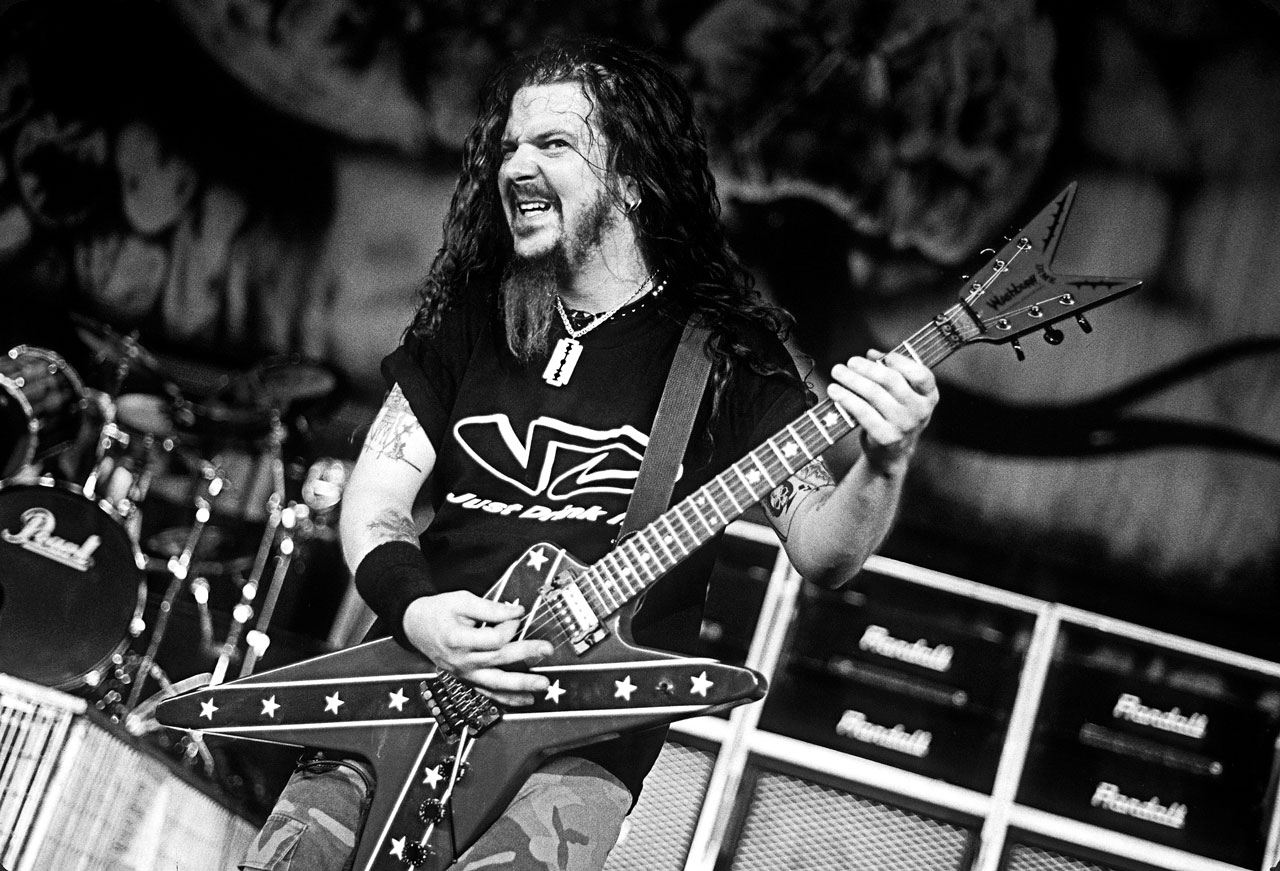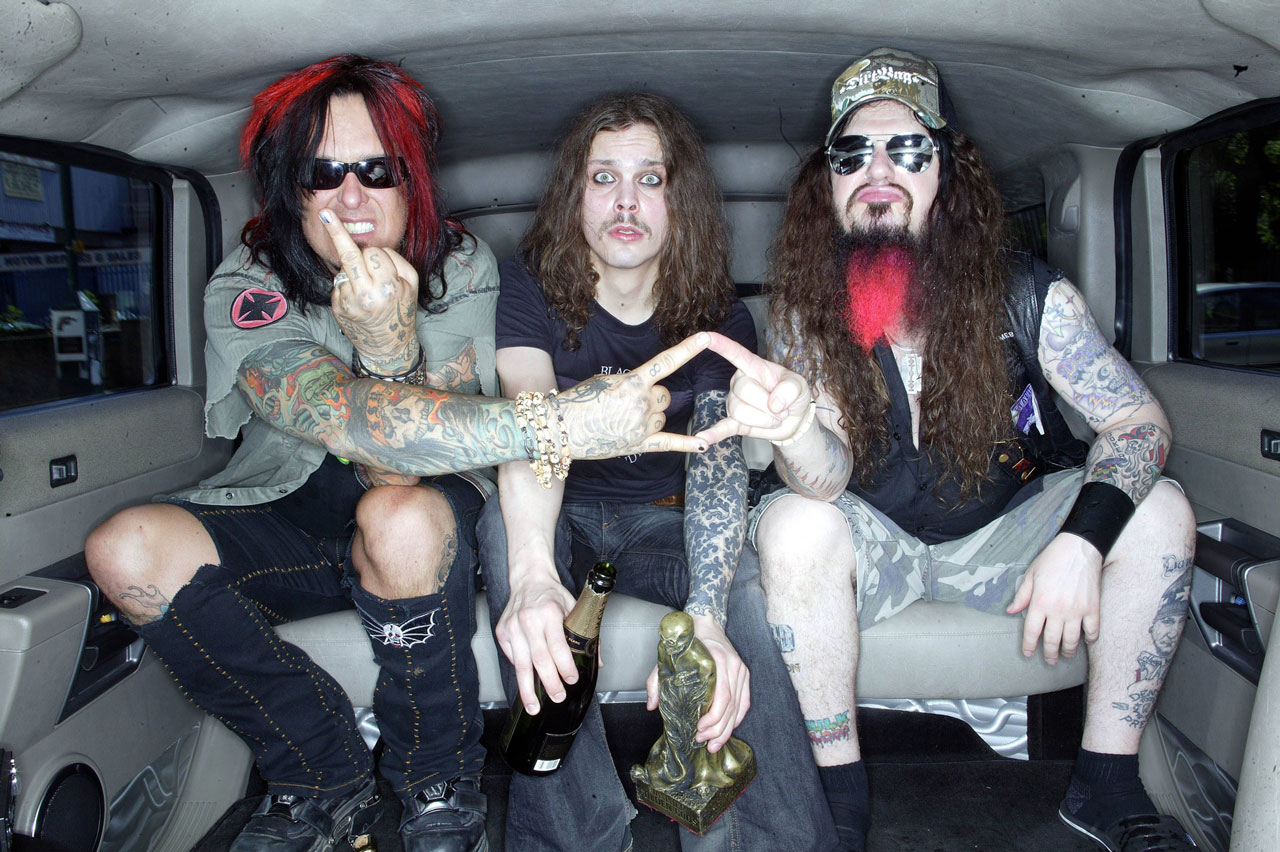1. Dimebag Darrell, Pantera

You know who we mean, right? A guitarist so unbelievably good he got banned from entering talent contests as a kid because he kept winning them. A cat so polar-cool he single-handedly took heavy metal in a new direction and influenced countless others to follow him.
A brother so fucking awesome that even death could not stop him getting his message across, as it continues to do today with every record still bought or downloaded, every YouTube clip still slavered over.
That’s right, smart-arse, who else could we possibly mean but Dimebag Darrell, the guitar god who gifted the world groove metal and so much more. There have been plenty of giant-killing shredders over the years. There have been the most immense soloists.
And of course there have been those masters of the metal universe: the riff overlords. The thing about Dimebag Darrell, though, is that he didn’t just excel at any one of those things. He could do all of them, not just as well as the next axe-grinder. Not just better, either. But in a whole new way he invented for himself, for us, forever.
When Dimebag Darrell died in 2004 – the victim of circumstances so crazily fucked-up many of us are still struggling to get what’s left of our heads around it years later – an unparalleled chapter in heavy metal history died with him. Dimebag Darrell had shown the way forward for metal and rock for so long and so brilliantly, when he went it was like the future went with him. Like an episode from the scariest unreality TV show of all.
But let’s not dwell too long here on that. Let’s talk instead about the music and the man who really made it into something else. Starting with the bleeding obvious – you don’t know Walk? You’re dead to us. You never got Pantera? You’re from the wrong planet.
For those of us on the chosen path – that is, those of us who don’t give a toss about the one-days and maybes, the fakers and the fuckheads who talk big and deliver nothing – the name Dimebag Darrell will always be as familiar yet unfathomable as the vast night sky; a name that conjures up an almost mystic sense of what it means to trip out so totally on guitar, re-entry is almost impossible without either burning up or spinning off into space. Of what it means to mind-meld on the glory of the guitar when it’s played by one blessed with the truly heavy presence of god’s gravity.
But don’t take it from us. Listen to what Dimebag’s brother – his real and musical brother – Vinnie Paul, speaking from his home in Texas, has to say. “Dime learned from an early age to really appreciate all the different styles of music.
"A lot of kids when they start playing they’re like, ‘I play heavy metal and that’s it.’ But we listened to a lot of stuff as kids, were exposed to a lot of different music, and it all went into the mix when we got our own band together later.”

Born in Ennis, Texas, in 1966, Darrell Abbott – Dime to his brother, and so Dime to us too – grew up a sports-loving, Kiss-crazy kid whose dad, Jerry Abbott, was a former rock guitarist and singer turned country musician and producer.
As a result, says Vinnie, he and his brother both grew up in a house full of the music of Elvis Presley, Buddy Holly and “a healthy dose of ZZ Top and Stevie Ray Vaughan.”
Things at home were far from idyllic, though. “When our parents got divorced, that was kind of hard. I felt I had to really become like the man of the house and take care of my brother for my mom while she was working.”
Two years older than Dime, when Vinnie became interested in playing the drums, so did his brother. ‘We had our fair share of fistfights as kids. But once we got interested in music together I don’t think we ever had any disagreements for the rest of our lives.’
Vinnie laughingly describes the way Dime ended up playing guitar instead of drums as “an old Eddie and Alex Van Halen story, basically. We only had one set of drums and when I got good I wouldn’t let him play them anymore. So he went to my dad and told him he wanted a guitar.”
Starting out on a cheap copy Les Paul, Vinnie recalls “walking by his bedroom down the hall and seeing him in there with Kiss make-up on! He’d be propped up in the mirror, just making all the moves. I’d go, ‘Man, you ever gonna learn to play that thing?’”
Some months later, Vinnie was astonished when Dime walked into his room one day and asked him: “You wanna jam, man?” Then proceeded to rifle out the chords to Deep Purple’s Smoke On The Water.
“We must have jammed that fuckin’ riff by itself for 10 hours over and over! And from that point on I knew we were gonna play music together.”
Dime knew it too, and from then on he’d practise every night and all weekend. “He immediately fell in love with his instrument, with metal, hard rock... Ace Frehley and Randy Rhoads were his favourites. He also spent a lot of time with my dad learning what he could. That was really important in his development.”

Both brothers would visit their father’s recording studio and watch the different artists he worked with record. “One of the best Southern blues guitarists that ever came in there was a guy called Bugs Henderson.”
A local Texas legend, Bugs played with everyone from Eric Clapton to Ted Nugent and Stevie Ray Vaughan. “Me and my brother would watch him and our jaws would drop. Then there were groups that came in that were straight up heavy metal. Seeing all these different musicians really had a big impact.”
Dime was 15 when he won his first talent contest. Just 16 when “they got tired of him winning and made him the judge instead. He went up the ladder really quick!”
There was one other quality the teenage Dime had that would hold him in good stead as the years passed, as he and Vinnie began putting Pantera together. “He had this amazing stage presence and charisma. He had a look that when he did his thing it made people excited.”
The onstage Dime was in stark contrast to the off stage young dude, who Vinnie recalls as “kind of quiet. It was only through his playing that he opened up and became the character he became.
He really expressed himself first through his guitar and as he got good at that it enabled him to become who he was. His personality was always blossoming, he was amazing.”
The first time most of us were introduced to Dime was via Pantera’s 1990 album, Cowboys From Hell. From its throbbing, schizoid opening riff to the pounding finale, CFH was a game-changer.
Yet as Vinnie says, Dime in his own mind was still only “aspiring to achieve the greatness of Eddie Van Halen, Randy Rhoads, Ace Frehley, those kinds of people. He felt he was getting there but he had so much drive and so much desire to be in the same league as those guys he made sure every note he played counted. He wanted the definition there in everything.”

By the time Pantera released their next album, Vulgar Display Of Power, Dime had found what he was looking for. “We’d travelled the world by then, and come back so much better players. And it was live where Dime really came into his own.”
It helped that Dime had such a powerfully tight band behind him. “Onstage, I could read his mind and he could read mine. It was pretty amazing the connection we had. One look and we knew where we were going.”
One of the definitive metal albums of all time, VDOP also contained the ultimate Dimebag Darrell riff. A juddering, monolithic force of nature he had simply begun playing around with one day during a soundcheck, and to which the band gleefully added. It was called Walk and it was about to change the way a generation of metal fans listened to and thought about music in general and the guitar in particular.
Did they know they had something special from the get-go? “Yeah,” says Vinnie. “We felt like we’d touched on something that really didn’t exist in the heavy metal world until then.”
The secret to occupying the space and time needed for Dime to come up with a riff and a groove like Walk, says Vinnie, was something so simple yet powerful it amazed them all.
“It was a shuffle. I remember when we finished the record, the first time we played it to our A&R person at the record company, Derek Shulman, Walk was one of the tracks we played to him and when we finished he stood there and he had this really almost confused look on his face.
“He said, ‘I never would have expected a heavy metal band, much less Pantera, to be able to do a shuffle, but it works! It’s fucking awesome.’ And we were all standing there thinking he’s gonna be, ‘Oh, it doesn’t fit the record’ or whatever, you know? So when he liked it so much we couldn’t believe it.
“But from that moment forward I think we all knew we had something special that really hadn’t been touched on in heavy metal before. And it comes from the Southern vibe, you know? It’s almost got a ZZ Top feel to it but it’s heavy as fuck. It’s got that pulse to it...” He growls the groove. “…almost like a record that’s skipping or something. Really, really driving at you, it gets to the point.”
It certainly does. Vinnie says that since his brother’s death, he’s had time to reflect on what made him such a special musician, and that it’s not all about the music.
“He really enjoyed putting a smile on people’s faces. That really made his day. It didn’t matter if he did it by playing the guitar for you, shaking your hand, giving you a guitar pick, doing shots with you at a bar, cooking you a steak dinner. If he’d put a smile on your face, he was happy. And that’s helped him attain the status he’s at.”
